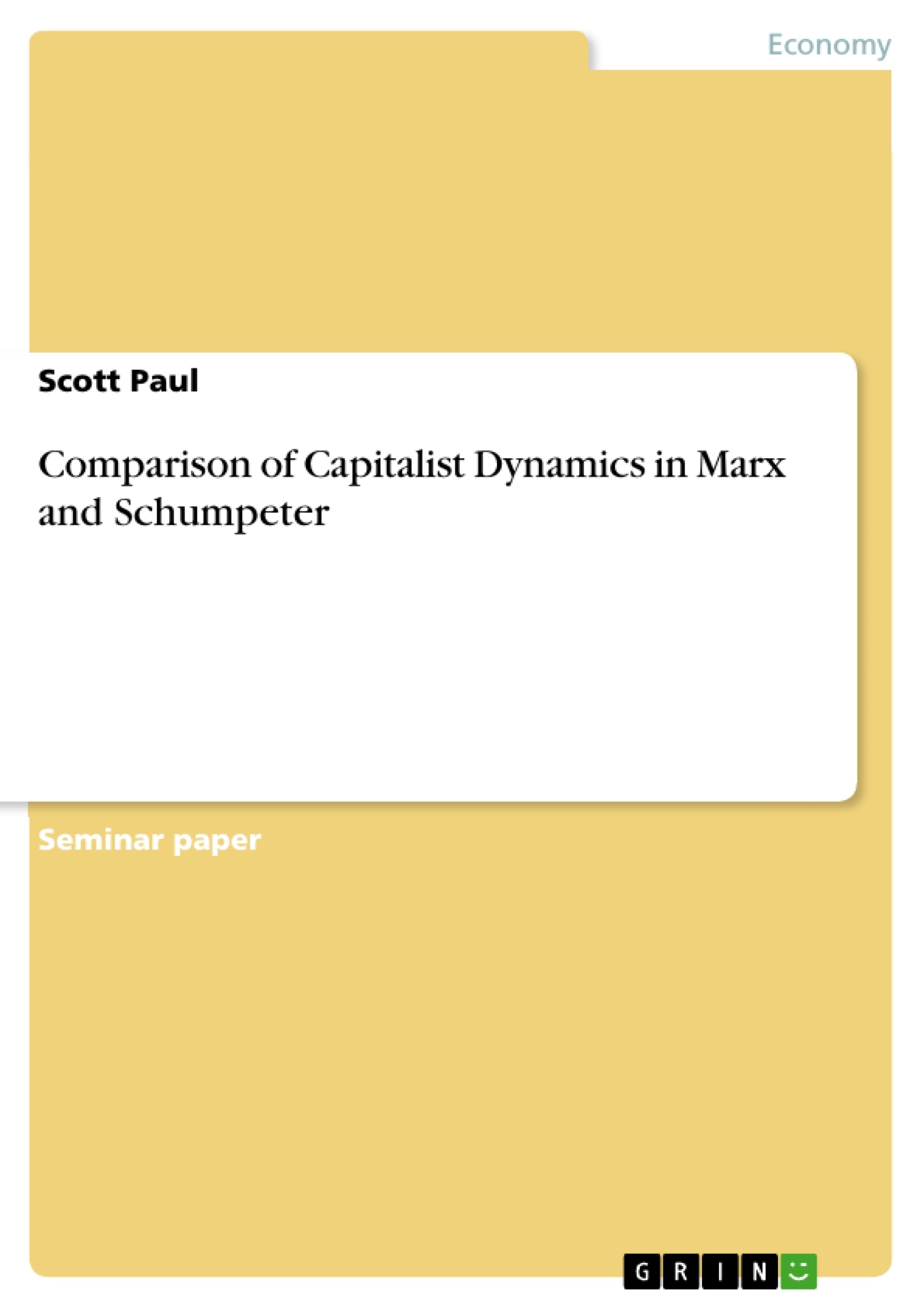Joseph Schumpeter was born the same year Karl Marx died. One might say Schumpeter was destined to follow in Marx’s footsteps. Marx had involved himself in the study of Capitalism and became a great source of influence for Schumpeter who elaborated on his theories. An essential part of their study was devoted to Capitalist Dynamics. Their views on the subject show fundamental similarities but demonstrate several differences as well, which are explained in part by their different experience of economic history. This paper will focus on comparing and contrasting the capitalist dynamics of Karl Marx and Joseph Schumpeter, their theories on what Capitalism is driven by and how it evolves.
As a starting point, it is interesting to distinguish Marx’s and Schumpeter’s opposed feeling of Capitalism. Marx studied the laws of motion of Capitalism because he was concerned about the exploitation of workers and thus was against Capitalism. Schumpeter, on the other side, approved of Capitalism and considered free market Capitalism the “best economic system”. Marx believes that unemployment will increase as workers are replaced by machines and that Capitalism impoverishes the masses. On the other side, Schumpeter believes that Capitalism can ameliorate the conditions of the workers: “The capitalist process, not by coincidence but by virtue of its mechanism, progressively raises the standard of life of the masses. It does so through a sequence of vicissitudes, the severity of which is proportional to the speed of the advance. But it does so effectively.” Karl Marx, however, was not completely against Capitalism as it “rescued a considerable part of the population from the idiocy of rural life”.
Inhaltsverzeichnis (Table of Contents)
- A comparison of Capitalist Dynamics in Marx and Schumpeter
- The Opposed Feelings of Capitalism
- The Cyclical Nature of Capitalism
- The Role of Innovation and Creative Destruction
- Capitalist Concentration and the Role of Monopolies
- Capitalists and Entrepreneurs
- The Future of Capitalism
Zielsetzung und Themenschwerpunkte (Objectives and Key Themes)
This paper examines the contrasting views of Karl Marx and Joseph Schumpeter on capitalist dynamics, focusing on their theories of what drives capitalism and how it evolves. The paper highlights their differing experiences with economic history and their perspectives on the role of innovation, capital accumulation, and monopolies.
- Capitalist dynamics and its cyclical nature
- The role of innovation and technological change in capitalist development
- The impact of capital accumulation and competition on capitalist cycles
- The emergence of monopolies and oligopolies within capitalism
- The role of entrepreneurs and capitalists in driving capitalist progress
Zusammenfassung der Kapitel (Chapter Summaries)
- A comparison of Capitalist Dynamics in Marx and Schumpeter: This chapter introduces the contrasting views of Marx and Schumpeter on capitalist dynamics and highlights the similarities and differences in their approaches.
- The Opposed Feelings of Capitalism: This chapter explores the contrasting perspectives of Marx and Schumpeter on the nature and desirability of capitalism, with Marx emphasizing the exploitation of workers and Schumpeter highlighting its benefits.
- The Cyclical Nature of Capitalism: This chapter analyzes the shared belief of Marx and Schumpeter in the cyclical nature of capitalism and examines their differing explanations for the causes of these cycles, with Marx focusing on capital accumulation and Schumpeter emphasizing innovation.
- The Role of Innovation and Creative Destruction: This chapter explores Schumpeter's concept of "creative destruction" and its role in driving capitalist progress, as well as Marx's views on the role of technological change in economic growth.
- Capitalist Concentration and the Role of Monopolies: This chapter examines the perspectives of Marx and Schumpeter on the emergence of monopolies and oligopolies in capitalism and their implications for innovation and competition.
- Capitalists and Entrepreneurs: This chapter compares Marx and Schumpeter's contrasting views on the roles of capitalists and entrepreneurs in capitalist development, with Marx emphasizing the macroeconomic forces driving progress and Schumpeter highlighting the role of individual innovators.
Schlüsselwörter (Keywords)
The main keywords and focus topics of the text include: capitalist dynamics, Marx, Schumpeter, innovation, capital accumulation, creative destruction, business cycles, monopolies, oligopolies, entrepreneurs, capitalists, exploitation, competition, and the future of capitalism.
Frequently Asked Questions
What are the main differences between Marx and Schumpeter regarding capitalism?
While Karl Marx focused on the exploitation of workers and believed capitalism would lead to mass impoverishment, Joseph Schumpeter viewed capitalism as the best economic system that progressively raises the standard of living through innovation.
What is Schumpeter's concept of "creative destruction"?
Creative destruction describes the process of industrial mutation that incessantly revolutionizes the economic structure from within, destroying old ones and creating new ones through innovation.
How did Marx view the role of machines in capitalism?
Marx believed that as workers are replaced by machines, unemployment would increase, leading to a "reserve army of labor" and the eventual downfall of the capitalist system.
What role does the entrepreneur play according to Schumpeter?
For Schumpeter, the entrepreneur is the central figure of capitalist dynamics, acting as the innovator who introduces new products and methods, driving economic progress.
Did both Marx and Schumpeter believe in capitalist cycles?
Yes, both agreed on the cyclical nature of capitalism, but Marx attributed these cycles to capital accumulation and crisis, while Schumpeter emphasized the waves of innovation.
- Quote paper
- Scott Paul (Author), 2006, Comparison of Capitalist Dynamics in Marx and Schumpeter, Munich, GRIN Verlag, https://www.grin.com/document/60421



